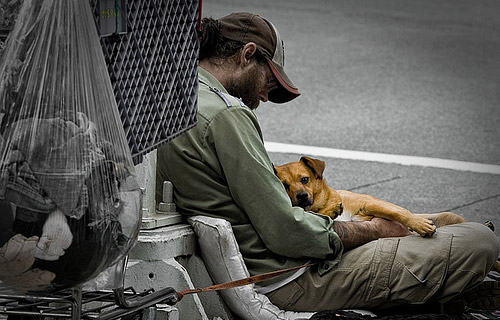But my heart resides, instead, with the homeless.
It’s been 35 years since my last interlude of homelessness. I’m still haunted by it, and I think there’s a part of me that will never recover.
I need to make it very clear that I was homeless in an absurdly minor and privileged way: On three occasions, I moved out of one New York apartment before working up the considerable energy required to find a new one, and for periods of several weeks to several months, I crashed with friends. I slept on floors and couches, I lived out of shopping bags. I had no place to call my own, and less privacy than I was used to, but I did have a safe haven from the outside world. I had no reason to be frightened, lonely or paralyzed by the enormity of my situation. My life was up in the air, so to speak, but I had plenty of options.
When I try to imagine what true homelessness must do to a person, I am overwhelmed with compassion and guilt.
In many of my dreams, I still have no home. Or if I do, I can’t find it. If I know where it is, I can’t get to it. If I get to it, it’s been leveled by a tornado or taken over by some strange tribe of bikers, hippies and ex-cons that has lots of dogs and lots of children. My subconscious was so traumatized by a tiny dip into homelessness that it collapsed and remained there.
I lived alone in my own house for 27 years. I loved it with a desperation that was tinged with my fear that I would somehow lose it.. Very few days went by that I didn't walk from room to room at least once and gaze gratefully at each aspect of its homeyness, its mine-ness. The light through the wooden blinds, the paintings, the easy chair, the breakfast nook, the bed, the books. I felt like hugging the walls, and sometimes I did. It was a dilapidated old thing, but I didn't care. It was my home, and it meant the world to me. I wanted everyone to have one.
The love for home, the pride in home, spilled out everywhere. I never cease to be amazed at the creativity, skill and tastefulness of ordinary people as they go about the task of making a home. At night, I was even more touched; as I meandered through the darkened streets, each golden-lighted window revealed a radiant scene of tender and personalized domesticity. I always felt so glad, so relieved, that people were snugly ensconced with the people and the things that meant the world to them.
All the world is a stage, and home is where we go to strip off the costume, hang up the role and collapse into the comforting arms of our “offstage” lives.
The homeless are forever onstage; they never get to use one of the most exquisite phrases in the English language: Let’s go home. If home is where the heart is, what must happen to the hearts of the homeless? And what must happen to the hearts of the rest of us, as we luxuriate in the security and beauty of home while others suffer so deeply? What’s happened to mine is that it’s hardened — it had to, in order to tolerate the compromise of proceeding with my life as if everything were fine. I’m not saying that we don’t deserve our homes; only that no one deserves homelessness.
What does home mean? Maybe you don’t really know until you’ve drifted around without one. You don’t realize what a mooring it is, what a refuge, how central it is to your grip on things, even to your sense of self. I can’t imagine how a person without a home can summon the strength and hope needed to turn his life around. How can you plan, dream, muster your determination, make ambitious promises to yourself, when you don’t even have a base of operation, a tiny room to call your own? The chaos and the dread, the lack of solitude and privacy, the humiliation and the grief would paralyze me—of that I’m certain.
I am forever grateful that I have a home, but I’ll never enjoy it fully until everyone has one.
It’s raining and thundering outside. The more dramatic it gets, the cozier I feel. I just had a hot shower after my jog, and slipped into some soft, baggy sweats. Sheets and towels are in the washer, bread is baking, soup is bubbling, coffee is perking and the radio is tuned to NPR. My cat rubs against me as if to say, “This is perfect.” It’s wonderful all right, but it isn’t perfect.
Homelessness haunts me. There’s no place like home.





